In a world that constantly bombards us with mixed messages about food—what to eat, what to avoid, what’s healthy today but harmful tomorrow—it’s no surprise that some people develop complicated, even fearful relationships with eating. For individuals struggling with food phobia—a persistent, irrational fear of eating—nourishment becomes not a source of comfort and vitality, but a source of anxiety and dread. While food phobia can stem from various psychological, physiological, or even cultural factors, its impact on both mental and physical health is profound. Thankfully, evidence-based approaches rooted in mindful nutrition, psychological insight, and gentle behavioral strategies offer a path toward healing.
You may also like: How to Stop Emotional Eating and Regain Control: Mindful Nutrition Strategies That Support a Healthier Lifestyle
This article explores the complex nature of food phobia, what drives the fear of eating, and how individuals can reclaim a sense of peace and safety with food through mindful practices. Drawing upon principles of psychology, nutritional science, and lived experience, we’ll examine how to foster a sustainable, nourishing relationship with food that supports both emotional well-being and physical health.
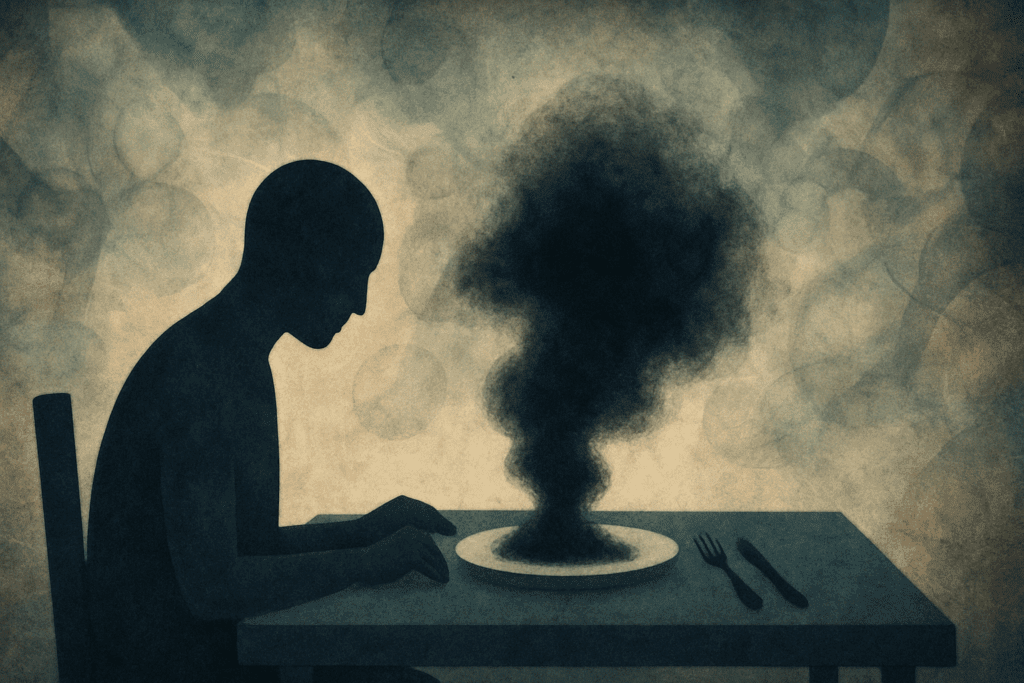
Understanding Food Phobia: The Psychology Behind the Fear of Eating
At its core, food phobia is more than a dislike of certain textures or flavors—it’s an intense, often debilitating fear that eating will cause harm. This fear can manifest in various forms. Some people are afraid of choking, vomiting, or experiencing a severe allergic reaction. Others associate food with loss of control or contamination. Still, others may link eating with past trauma, disordered eating patterns, or health-related anxieties.
While not officially classified as a separate disorder in the DSM-5, food phobia is often seen in conditions such as Avoidant/Restrictive Food Intake Disorder (ARFID), obsessive-compulsive disorder (OCD), and certain anxiety or trauma-related disorders. For many individuals, the fear of eating is not rooted in vanity or dieting culture but in genuine emotional distress. It may be triggered by a single traumatic event—such as a choking episode—or evolve gradually through reinforcement, anxiety, or misinformation.
The psychological toll of food phobia can be immense. People with this condition often experience social isolation, low energy, nutrient deficiencies, and an ongoing state of hypervigilance around meals. The body’s basic need for sustenance becomes a battlefield, and the simple act of eating is laced with dread. Recognizing that food phobia is real, valid, and deserving of compassionate attention is the first step toward recovery.
How Food Phobia Affects Physical and Mental Health
When a person lives in fear of food, the consequences extend far beyond the plate. Physically, chronic undernourishment can lead to fatigue, poor concentration, weakened immunity, digestive disturbances, and even hormonal imbalance. In children and teens, food phobia may stunt growth or cognitive development, while adults may face muscle wasting or increased susceptibility to illness.
Mentally, the constant avoidance of food creates a loop of anxiety, guilt, and self-blame. Mealtimes become stressful rather than enjoyable, and the act of nourishment becomes something to be endured rather than celebrated. Over time, this ongoing anxiety may develop into more generalized fears, depression, or disordered eating behaviors. Some individuals even develop rituals to cope with the fear—such as excessive chewing, checking expiration dates, or only eating in specific environments—further limiting their dietary variety.
The overlap between food phobia and broader mental health challenges is important to acknowledge. Often, what presents as a fear of eating is intertwined with other anxieties, such as a fear of contamination, illness, or social judgment. These coexisting concerns can complicate diagnosis and treatment, making a holistic, multidisciplinary approach all the more essential.
Root Causes: What Triggers the Fear of Eating?
There is no single cause of food phobia, and understanding the root of the fear often requires deep introspection and therapeutic exploration. For some, the phobia stems from a specific traumatic incident, such as choking, food poisoning, or witnessing someone else have a negative reaction to food. In these cases, the brain encodes the experience as dangerous, and future eating episodes trigger a fight-or-flight response.
Others may develop a fear of eating gradually due to anxiety disorders, health worries, or misinterpreted bodily sensations. For instance, a person who experiences acid reflux may associate that discomfort with eating and eventually become afraid to eat at all. Similarly, individuals who struggle with OCD may fear contamination or the perceived “impurity” of food, leading to extreme avoidance.
Cultural messages and diet culture also play a role. In societies that emphasize thinness or demonize certain foods, people may internalize the belief that eating is inherently bad or shameful. This can erode trust in one’s body and distort the ability to eat intuitively or without fear.
Childhood feeding issues—such as overly controlling caregivers, medical conditions that made eating painful, or neglect—may also lay the foundation for food-related anxiety. In these cases, food phobia can reflect deeper relational wounds and struggles with autonomy.
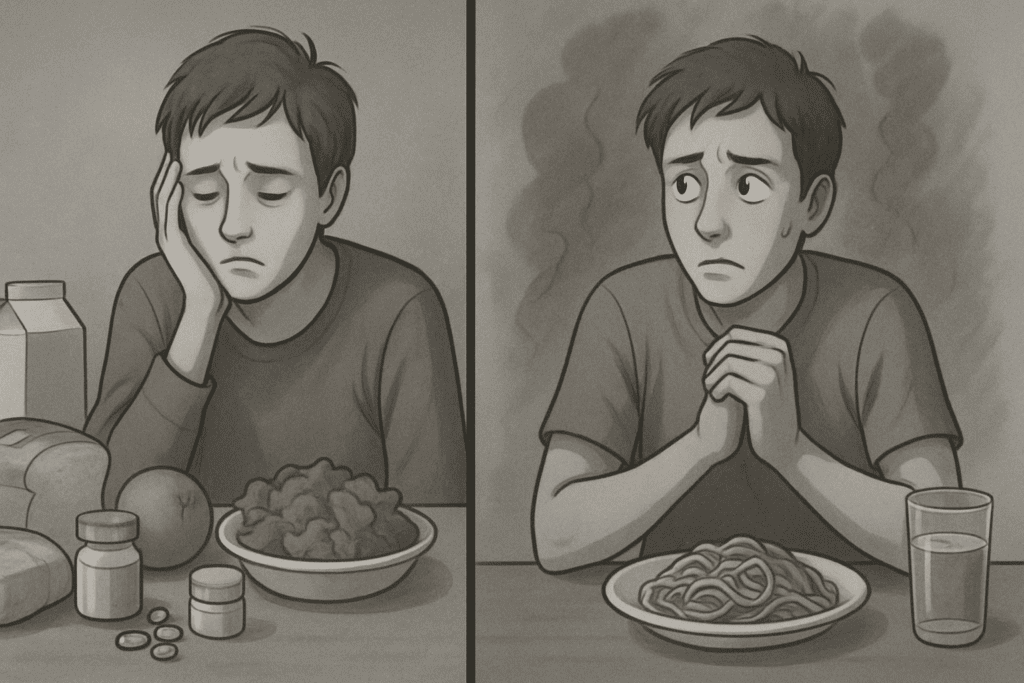
The Role of Mindful Eating in Healing Food Phobia
Mindful eating, rooted in the practice of mindfulness, involves paying full attention to the experience of eating—without judgment, distraction, or rushing. It emphasizes awareness of hunger and fullness cues, sensory experiences, and emotional responses to food. For individuals struggling with a fear of eating, this approach offers a gentle, non-threatening way to rebuild trust in the body and the eating process.
One of the key principles of mindful eating is curiosity over judgment. Instead of labeling foods as “good” or “bad,” mindful eating encourages individuals to notice how foods make them feel—physically, emotionally, and mentally. This process helps reframe eating as an act of self-care rather than a risk.
Mindfulness also helps interrupt the anxiety spiral. By grounding attention in the present moment, individuals can observe their thoughts and fears without becoming overwhelmed by them. For example, if someone feels panicked at the thought of eating bread, they might gently observe the sensations in their body, name their emotions, and remind themselves that past experiences do not dictate future outcomes.
When practiced consistently, mindful eating can rewire conditioned responses and decrease the intensity of food-related fear. It’s not about forcing oneself to eat fear-inducing foods immediately, but about cultivating awareness, compassion, and resilience over time.
Reintroducing Food Safely: Building Trust One Bite at a Time
For many people with food phobia, the idea of sitting down to a full meal can feel impossible. That’s why a gradual, step-by-step reintroduction process is often the most effective way to overcome avoidance. Rather than attempting to confront all fears at once, this method emphasizes small wins that build confidence and momentum.
Exposure therapy, a well-established psychological technique, can be adapted to help people gradually face and overcome their fear of eating. With the support of a therapist or registered dietitian, individuals can start with “safe” foods—those that feel less threatening—and slowly expand their food repertoire. The key is consistency, patience, and self-compassion.
This process may involve practicing deep breathing or relaxation techniques before meals, preparing food in familiar ways, or eating in calming environments. Over time, these rituals help desensitize the brain to perceived threats and reestablish positive associations with food.
Equally important is understanding that setbacks are part of the journey. If fear returns or a particular food triggers anxiety, it’s not a sign of failure—it’s an opportunity to reflect, recalibrate, and continue forward with care.
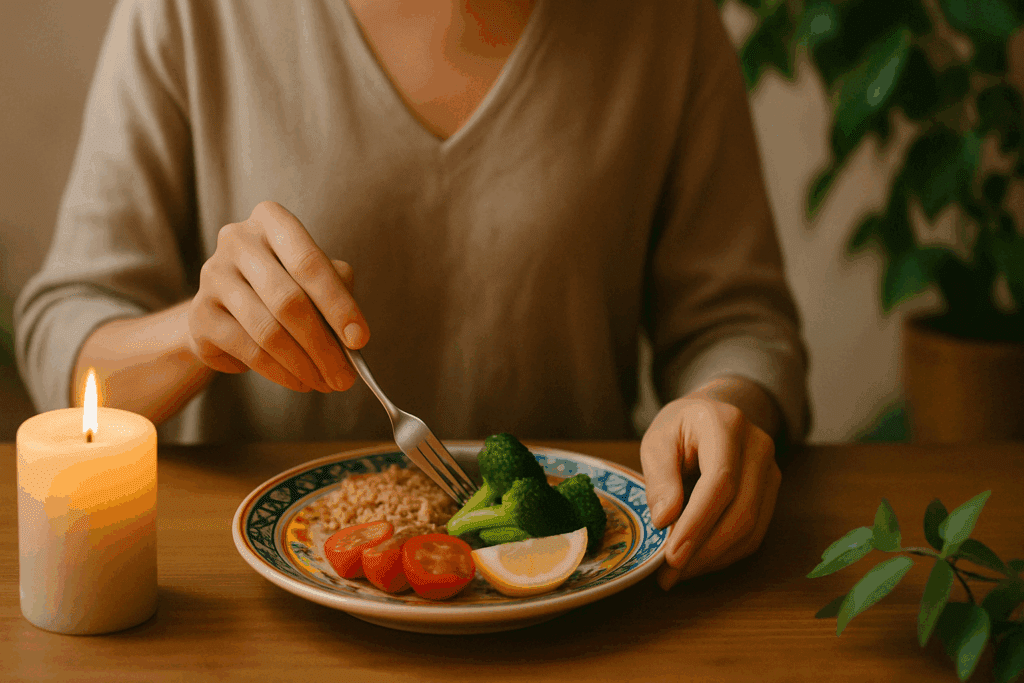
Nutrition Therapy and Professional Support
Addressing food phobia often requires a multidisciplinary team that may include mental health professionals, registered dietitians, occupational therapists, and sometimes medical doctors. Each professional brings a unique perspective, ensuring that both the emotional and physiological aspects of the condition are addressed.
A registered dietitian with experience in disordered eating can help individuals ensure nutritional adequacy even during periods of restriction. They can also assist with meal planning, nutrient repletion, and building a positive relationship with food. Rather than imposing rigid meal plans, effective nutrition therapy encourages autonomy, experimentation, and balance.
Meanwhile, therapists—especially those trained in cognitive-behavioral therapy (CBT), acceptance and commitment therapy (ACT), or trauma-informed approaches—can help individuals identify and challenge the thought patterns that reinforce the fear of eating. Therapy may also focus on developing coping skills, exploring past experiences, and building emotional regulation.
Medical evaluation is sometimes necessary, especially if malnutrition, gastrointestinal issues, or other health concerns are present. In such cases, medical professionals can rule out underlying conditions and provide necessary interventions, all while collaborating with the broader care team.

Creating a Supportive Food Environment
Healing from food phobia doesn’t happen in a vacuum. Our environments, relationships, and daily routines all influence how we feel about food. Cultivating a supportive, nonjudgmental atmosphere around eating is essential for long-term recovery.
This may involve setting gentle mealtime routines, removing triggering content (such as diet culture messages on social media), and communicating openly with friends or family about boundaries and needs. If possible, sharing meals with trusted individuals can also be healing, as it reduces isolation and provides reassurance.
At the same time, individuals must learn to become their own advocates and allies. Practicing self-talk that affirms safety, worthiness, and progress can be a powerful antidote to fear-based thinking. For example, replacing “I can’t eat this; it’s dangerous” with “I am learning to trust food and my body” reinforces a growth mindset.
Ultimately, the goal is not to achieve perfect eating, but to develop a peaceful and intuitive relationship with food that supports overall well-being.
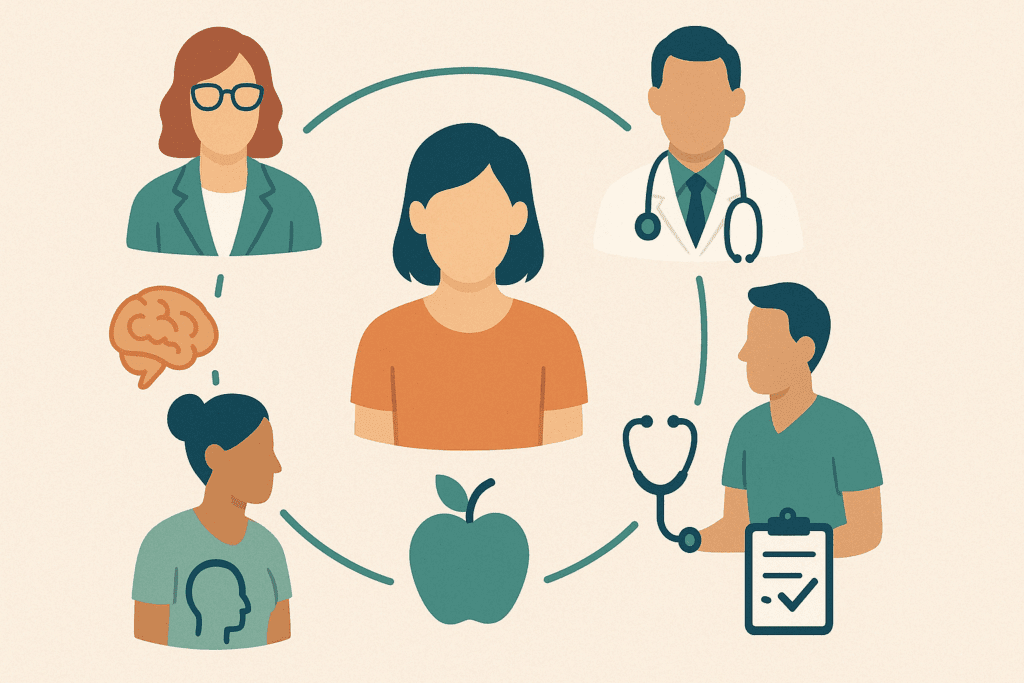
How Mindful Nutrition Strengthens Mental and Physical Resilience
Mindful nutrition goes beyond simply choosing “healthy” foods—it’s about aligning eating habits with the body’s needs, values, and lived experiences. For those healing from a fear of eating, this approach fosters both physical recovery and emotional strength.
By tuning into the body’s signals, mindful nutrition encourages individuals to eat in response to hunger and fullness, rather than fear or external rules. It supports metabolic health, stabilizes mood, and helps restore energy levels. Moreover, it nurtures a sense of agency and body trust that is often eroded by phobic thinking.
This approach also helps repair the disconnect between mind and body. Many individuals with food phobia have learned to override or mistrust their bodily sensations, associating them with danger. Mindful nutrition invites a reawakening of the senses—flavor, texture, temperature—and reframes eating as a source of pleasure and vitality.
Incorporating foods that are satisfying, diverse, and nutrient-rich becomes less about perfection and more about presence. Whether it’s savoring a warm soup, enjoying the crunch of fresh vegetables, or simply feeling gratitude for nourishment, mindful nutrition makes room for joy and connection.
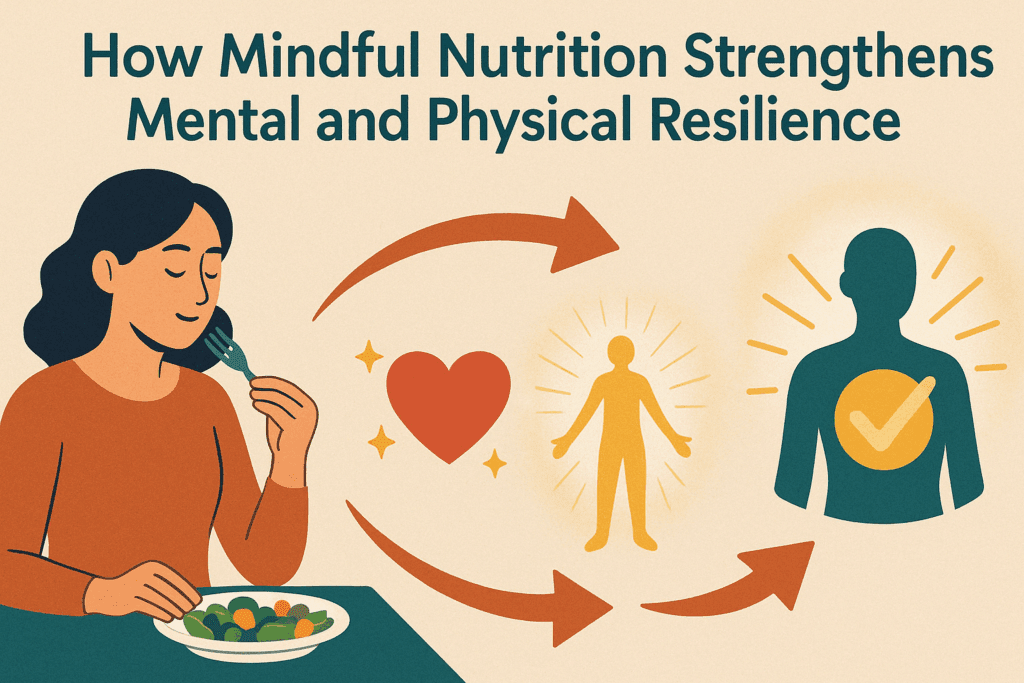
Reflecting on Progress and Looking Ahead
Recovery from food phobia is rarely linear, but every step forward—no matter how small—is meaningful. For those who have lived under the shadow of a fear of eating, even basic improvements, like adding a new food or enjoying a shared meal, mark significant victories. These moments serve as reminders that healing is not only possible but already underway.
As individuals move through the recovery process, reflection becomes a valuable tool. Journaling, therapy, or mindful meditation can help track progress, highlight strengths, and provide space for self-compassion. Looking back on the journey reinforces resilience and prepares the mind for continued growth.
The ultimate goal is not simply to eat without fear, but to build a sustainable, nourishing relationship with food that supports long-term mental and physical health. This relationship is rooted in trust, awareness, and kindness—qualities that take time to cultivate but yield profound rewards.
Frequently Asked Questions: Overcoming Food Phobia and the Fear of Eating
1. Can food phobia be linked to sensory processing issues, and how can that influence treatment approaches?
Yes, food phobia can be deeply connected to sensory processing challenges, particularly in individuals who experience heightened sensitivity to textures, smells, or temperatures of food. These individuals may not fear eating in the traditional sense but may find certain sensory experiences overwhelming or even distressing. This nuance often requires the involvement of occupational therapists or sensory integration specialists who can gradually introduce tolerable stimuli through desensitization techniques. Addressing the sensory component allows for more tailored strategies that extend beyond cognitive behavioral therapy. A comprehensive understanding of sensory input helps reframe food phobia not just as anxiety-driven but also as a physiological processing difference, which can lead to more compassionate and effective care.
2. How do social dynamics impact the development or persistence of food phobia?
Social dynamics can significantly reinforce or intensify a fear of eating, especially when individuals feel judged or scrutinized in group settings. People with food-related anxieties often avoid social gatherings where food is a focal point, fearing embarrassment or loss of control. Over time, this avoidance may evolve into social isolation and exacerbate symptoms of anxiety or depression. In some cases, negative comments about eating habits, body image, or food choices during childhood can plant the seeds of food phobia, particularly when these messages come from trusted authority figures. Addressing the social context, including assertiveness training and boundary-setting in therapy, is essential for building long-term resilience.
3. Are there cultural or religious considerations that complicate the experience of food phobia?
Cultural and religious food practices can intersect in complex ways with food phobia, especially when individuals feel pressure to adhere to dietary customs they associate with stress or fear. In some cultures, communal eating is a sacred practice, and avoidance may be interpreted as disrespectful, adding another layer of anxiety. Others may experience internal conflict between traditional beliefs and their physical reactions to certain foods, creating guilt or shame that reinforces avoidance behaviors. When treating individuals from diverse backgrounds, practitioners must approach their fear of eating with cultural humility, integrating culturally competent care and validating the individual’s values and experiences. Tailoring interventions in a culturally sensitive manner can bridge gaps and reduce treatment resistance.
4. Can medical conditions like gastrointestinal disorders contribute to food phobia, and how should this be addressed?
Absolutely. Medical conditions such as gastroparesis, irritable bowel syndrome (IBS), and acid reflux can inadvertently condition individuals to associate eating with pain, discomfort, or digestive distress. In such cases, the fear of eating is not imagined—it is a learned response to real, unpleasant consequences. This makes collaborative care essential, where gastroenterologists, dietitians, and mental health professionals work together to treat both the physical symptoms and psychological fear responses. Incorporating medical nutrition therapy and using evidence-based relaxation techniques during meals can help the person regain trust in their body’s ability to digest food safely, minimizing the physical triggers that often underpin food phobia.
5. What role does self-compassion play in recovering from a fear of eating?
Self-compassion is a cornerstone of recovery from food phobia, yet it’s often underemphasized in traditional interventions. Individuals dealing with a fear of eating frequently hold themselves to unrealistic standards or blame themselves for their struggles, which can deepen avoidance and shame. Cultivating a compassionate inner dialogue helps disrupt this cycle, allowing space for mistakes and setbacks without spiraling into self-criticism. Mindfulness-based self-compassion practices encourage individuals to acknowledge their fear with gentleness and to honor the emotional pain underlying their behaviors. Over time, fostering self-kindness improves emotional resilience and supports long-term behavioral change more effectively than willpower alone.
6. Are there innovative technologies or digital tools that can support those with food phobia?
Yes, emerging technologies are beginning to play a supportive role in treating food phobia, particularly through mobile health (mHealth) apps and virtual reality (VR). Some mobile apps offer guided mindful eating programs, CBT-based exercises, or meal planning support tailored for those with anxiety about food. Virtual reality exposure therapy is also gaining traction, allowing individuals to simulate eating scenarios in a controlled digital environment, gradually reducing fear responses. These tools can be particularly helpful for those who are not yet ready for in-person treatment or who prefer anonymity. While not standalone solutions, they offer adjunctive support when integrated into a comprehensive care plan for managing the fear of eating.
7. How can family members or caregivers best support someone with food phobia without increasing pressure?
Supporting someone with food phobia requires a delicate balance between encouragement and respect for boundaries. Over-involvement or excessive pressure to eat can backfire, deepening resistance and damaging trust. Instead, loved ones can focus on offering nonjudgmental presence during meals, validating the person’s fears without reinforcing avoidance. Practicing shared meals where the individual is not expected to eat but can participate socially may also ease anxiety over time. Education is key—when families understand that fear of eating is rooted in genuine distress rather than defiance, they’re more likely to respond with empathy and patience. Collaborative communication and participation in therapy sessions (when appropriate) can also reinforce recovery goals.
8. What are some long-term strategies for relapse prevention in food phobia recovery?
Relapse prevention in food phobia recovery centers on building sustainable routines, developing emotional coping skills, and maintaining awareness of triggers. It’s crucial for individuals to regularly check in with themselves about their relationship with food, especially during times of stress, illness, or change, which may rekindle old fears. Continuing with occasional therapy or peer support groups can provide accountability and early intervention if symptoms resurface. Journaling, structured meal times, and maintaining variety in food choices help reduce the rigidity that often precedes relapse. Recognizing that fear of eating may fluctuate over time encourages individuals to approach setbacks with curiosity rather than shame, supporting long-term resilience.
9. Can someone recover from food phobia without formal therapy, and what might that look like?
While formal therapy is strongly recommended for moderate to severe cases, some individuals with milder forms of food phobia may experience progress through self-guided approaches. These can include mindfulness meditation, structured meal challenges, and education on nutritional science to reduce irrational fears. For example, someone afraid of eating due to misinformation about food additives might benefit from reading peer-reviewed literature and experimenting with small portions of feared foods while tracking their physical and emotional responses. Support from trusted friends or mentors who model healthy eating behaviors can also serve as a gentle form of exposure. However, even in self-directed recovery, recognizing when professional help becomes necessary is vital—particularly if the fear of eating begins to impair daily functioning.
10. What future trends are emerging in research and treatment of food phobia?
Research into food phobia is still growing, but recent studies suggest promising directions. Neurobiological investigations are exploring how the brain’s fear circuitry reacts to food stimuli, offering insights for more targeted pharmacological or behavioral interventions. There is also increasing interest in the gut-brain axis, examining whether disruptions in gut microbiota could influence anxiety responses related to eating. Trauma-informed care is becoming more central to treatment approaches, recognizing that unresolved trauma may underlie both food phobia and disordered eating. Additionally, integrative models that combine psychotherapy, nutritional counseling, and somatic therapies are gaining traction for their holistic efficacy. As understanding deepens, treatment for the fear of eating is likely to become more nuanced, inclusive, and effective in addressing the multifaceted nature of this condition.
Embracing Recovery: Moving Beyond Food Phobia with Compassion and Clarity
Navigating the complexities of food phobia and overcoming a fear of eating requires patience, courage, and support—but it also offers the opportunity for profound transformation. Through mindful nutrition strategies, therapeutic guidance, and compassionate self-reflection, individuals can reclaim their relationship with food and rediscover the joy of nourishment.
Rather than viewing eating as a threat, recovery invites a new perspective—one that sees food as a source of strength, connection, and care. With each mindful bite, the body is reminded that it is safe, worthy, and capable of healing. By integrating the principles of mindful eating, trusting professional support, and cultivating a supportive environment, individuals can begin to dissolve fear and move toward a life of greater freedom and vitality.
For anyone struggling with food phobia, know that your experience is valid, your fears are real, and your recovery is possible. Healing does not happen overnight, but with consistent effort and the right support, it is absolutely within reach. The path may be challenging, but the destination—peace with food and self—is more than worth it.
Was this article helpful? Don’t let it stop with you. Share it right now with someone who needs to see it—whether it’s a friend, a colleague, or your whole network. And if staying ahead on this topic matters to you, subscribe to this publication for the most up-to-date information. You’ll get the latest insights delivered straight to you—no searching, no missing out.
Further Reading:
Always Thinking About Food? Here Are 9 Tips on How to Stop
Overcoming Fear of Eating: A Case Study of a Novel Use of Exposure and Response Prevention

